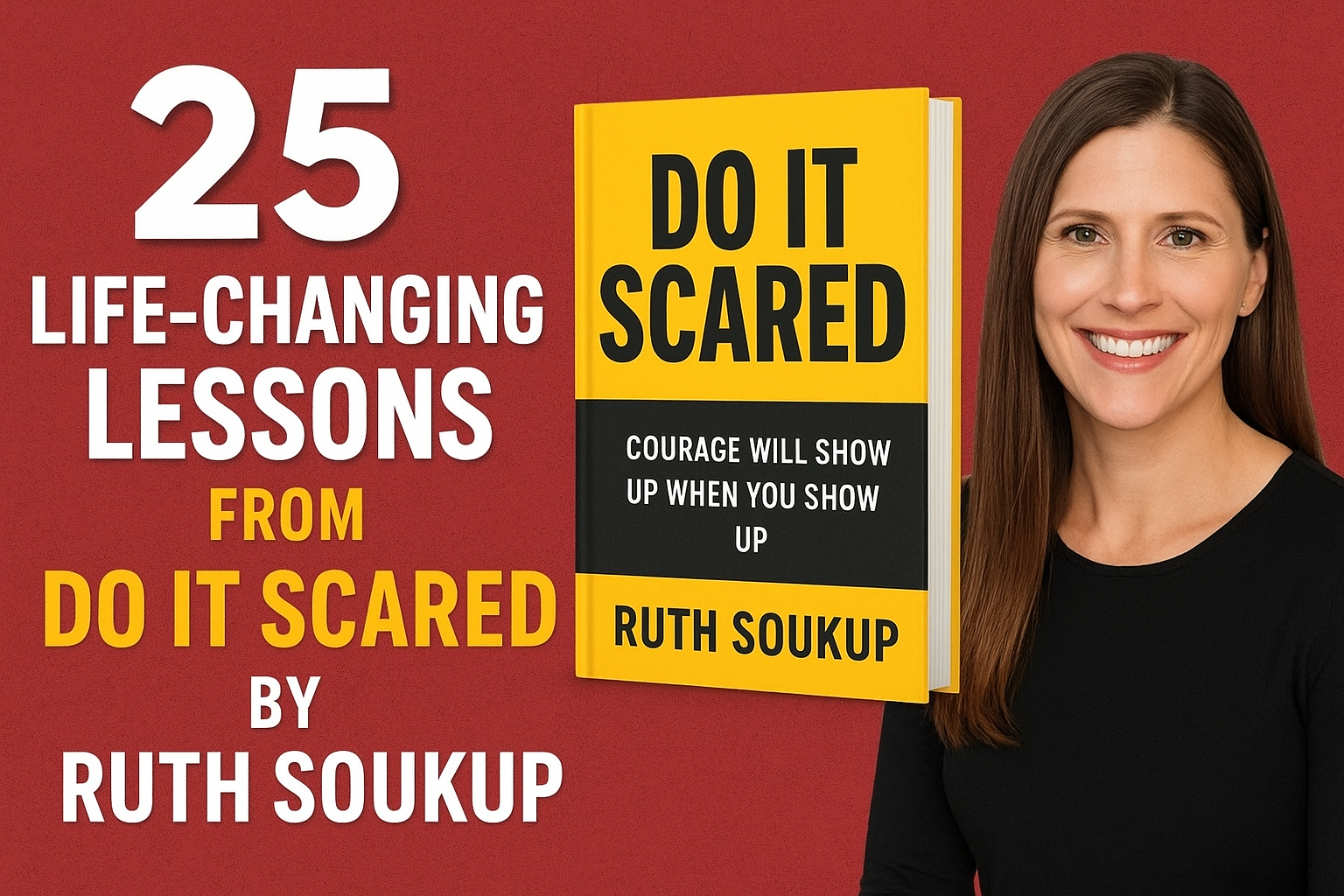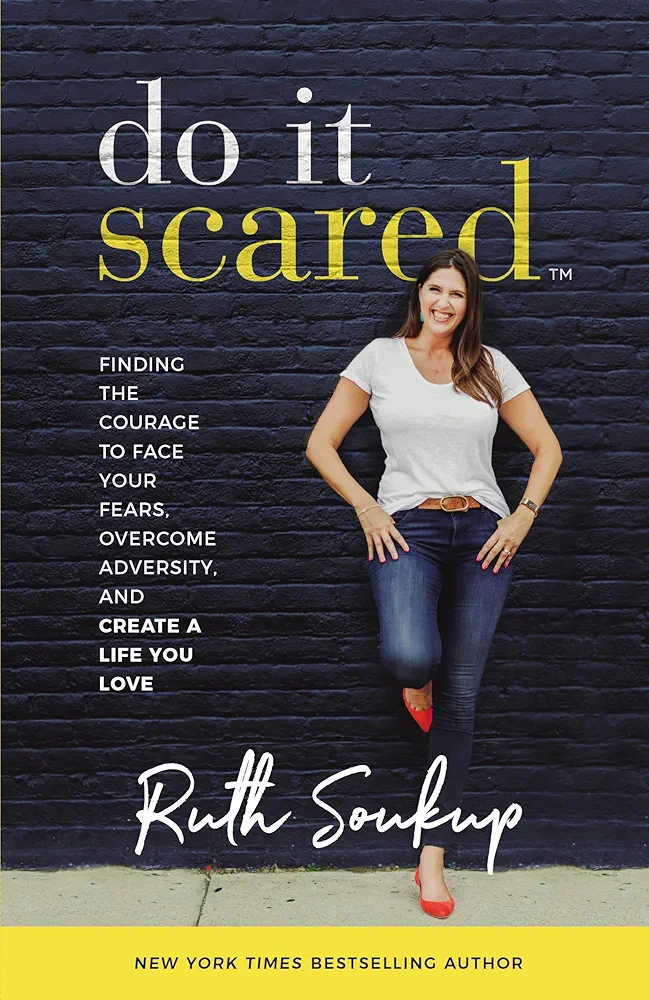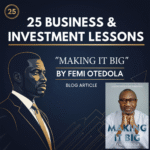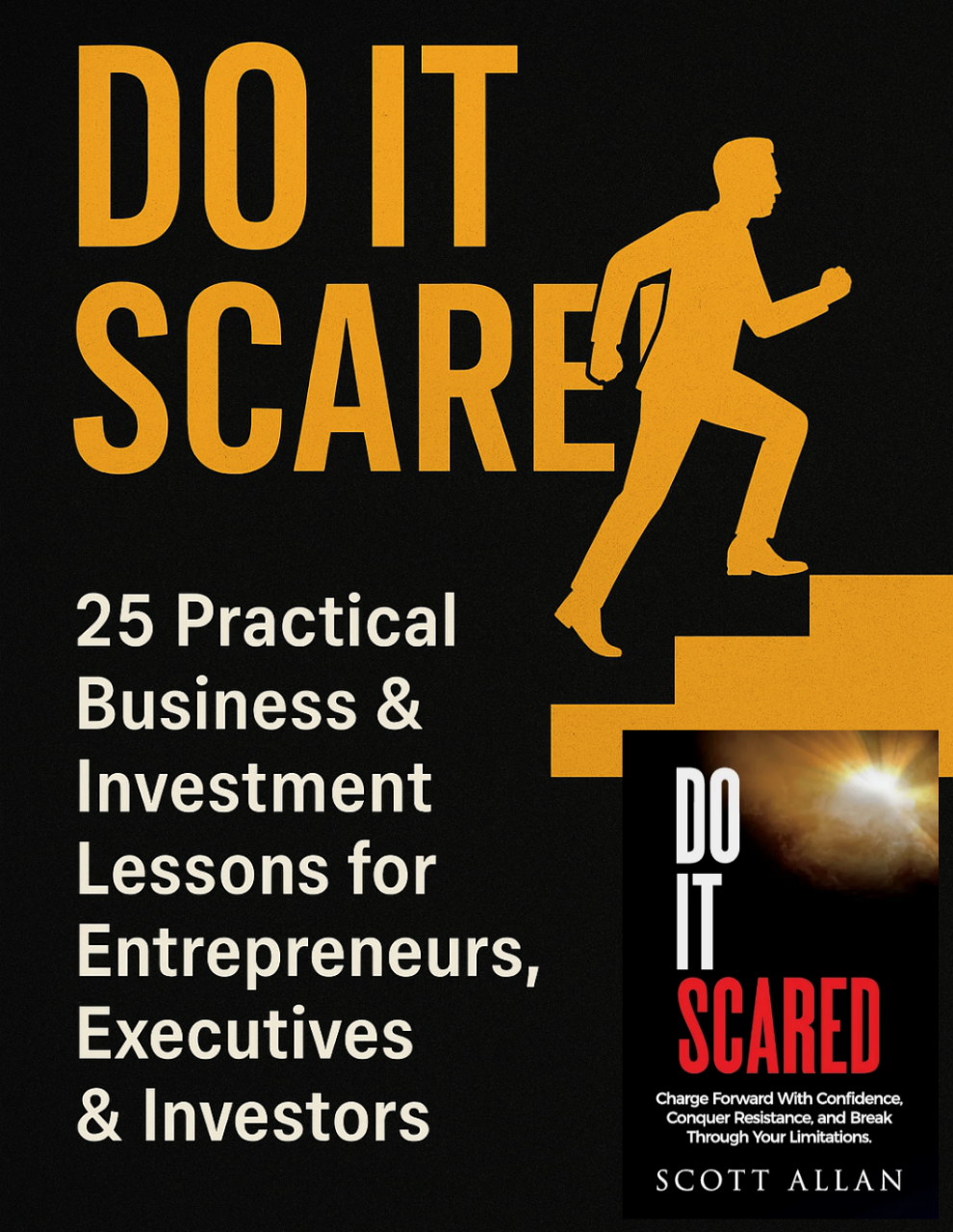Fear is a strange thing. It doesn’t always come with flashing red lights or sirens. Sometimes it hides in plain sight — behind excuses, perfectionism, procrastination, or even the pursuit of “safety.” I know, because I’ve been there.
As an entrepreneur and investor with more than three decades of experience, I’ve faced seasons when fear nearly paralyzed me — fear of failure, fear of rejection, fear of losing what I’d built. When I read Do It Scared by Ruth Soukup, something clicked deep within me. It wasn’t a book about becoming fearless; it was about acting despite fear.
Ruth’s message reminded me that courage isn’t the absence of fear — it’s moving forward while your knees still shake. It’s choosing obedience over comfort, purpose over paralysis, and faith over fear.
This book has reshaped the way I mentor business owners, startup founders, and investors. Today, I want to share 25 practical lessons I learned from it — expanded with real-world business logic, moral insight, and timeless biblical wisdom.

About the Book & Author
Book Title: Do It Scared: Finding the Courage to Face Your Fears, Overcome Adversity, and Create a Life You Love
Author: Ruth Soukup
Genre: Personal Development, Entrepreneurship, Mindset, Faith-Based Nonfiction
Ruth Soukup is a renowned blogger, entrepreneur, and founder of Living Well Spending Less and Elite Blog Academy. Her writing focuses on helping people break free from fear, take decisive action, and live purpose-driven lives. In Do It Scared, she blends personal stories, psychological research, and biblical principles to help readers confront the root causes of fear — and replace them with courage and clarity.
The 25 Practical Lessons I Learned from “Do It Scared”
Lesson 1: Fear Is Not Your Enemy — Inaction Is
One of the first truths Ruth teaches is that fear isn’t meant to be eliminated; it’s meant to be understood and managed. As an entrepreneur, you’ll never reach a point where fear disappears — it simply evolves. Fear of starting becomes fear of scaling; fear of failing becomes fear of succeeding.
The real enemy isn’t fear — it’s inaction. The Bible reminds us in James 2:17 that “faith without works is dead.” Courage is doing the work even when the outcome is uncertain. When you feel afraid, don’t freeze — take the next small step.
Lesson 2: Identify Your Fear Archetype
Ruth discovered that fear shows up differently in each of us. She categorizes fear into archetypes like the Procrastinator, the People-Pleaser, the Rule Follower, the Outcast, the Self-Doubter, and others.
In business, understanding your fear type helps you manage your blind spots. For instance, if you’re a Procrastinator, you may overthink decisions to avoid mistakes. If you’re a People-Pleaser, you might say yes too often and stretch yourself thin.
Once you name your fear, you disarm its power. Proverbs 4:7 says, “Wisdom is the principal thing; therefore get wisdom.” Knowing your fear pattern gives you wisdom to act strategically rather than emotionally.
Lesson 3: Action Cures Fear
Fear feeds on uncertainty. The longer you think about doing something, the scarier it becomes. Action, however, starves fear of its energy.
When I was starting one of my first ventures, I spent weeks overanalyzing. The day I made the first phone call to a potential client, the fear began to fade. That’s the principle Ruth emphasizes — clarity comes from action, not thought.
Just like Peter stepping out of the boat in Matthew 14, you must take the step first. Only then do you discover that the waves can hold you when your eyes are on purpose.
Lesson 4: Perfection Is Just Fear Disguised as Productivity
Many of us claim we’re “just trying to make it perfect,” but in truth, we’re afraid of being judged. Perfection is a lie that keeps progress hostage.
In business, the product that launches imperfectly will always outperform the perfect one that never ships. Ruth says, “Better done than perfect.” That’s why faith demands action — not flawless execution.
Even God’s chosen leaders in Scripture weren’t perfect — Moses stuttered, David stumbled, and Peter denied Jesus. Yet all of them acted. Excellence is achievable; perfection is not.
Lesson 5: Your Why Must Be Stronger Than Your Fear
If your “why” isn’t clear, your fear will always win. Ruth challenges readers to define their mission — not just what they do, but why they do it.
In entrepreneurship, your “why” is your compass. It keeps you steady when profits drop, when people doubt you, and when results delay. Your why must have emotional depth — it should move you to tears if needed.
As Nehemiah rebuilt Jerusalem’s walls amid opposition, he said, “I am doing a great work and cannot come down.” (Nehemiah 6:3). When you know your purpose, you don’t get distracted by fear.
Lesson 6: Courage Is a Muscle — It Strengthens with Use
You don’t become courageous overnight; you build it like a habit. Ruth insists that courage grows every time you choose faith over fear — in small things first.
Think of it like strength training. You don’t lift 100 pounds on day one; you start with 10. Likewise, courage compounds with every bold decision — every risk you take, every fear you face.
David didn’t fight Goliath first; he fought the lion and bear. Your small acts of courage prepare you for your future giants.
Lesson 7: Comparison Is a Thief of Joy — and Progress
In today’s social media era, comparing your beginning to someone else’s highlight reel is poison. Ruth reminds us that comparison creates paralysis.
When you compare your chapter 2 to someone’s chapter 20, you rob yourself of gratitude and growth. Your path is unique, and so are your timings.
Galatians 6:4 encourages us, “Each one should test their own actions, then they can take pride in themselves alone.” Run your race. Don’t let envy rewrite your destiny.
Lesson 8: Success Requires Discomfort
No meaningful growth happens in your comfort zone. Ruth calls fear “a signpost pointing you toward the place you need to go.”
Every entrepreneur wants freedom, but freedom comes through facing discomfort — through the awkward pitch, the uncertain launch, the tough negotiation. The Red Sea only parted after Moses stepped forward. The walls of Jericho only fell after seven days of obedience.
Your next level is always on the other side of something uncomfortable.
Lesson 9: Failure Is Feedback, Not Final
One of Ruth’s most powerful truths is that failure isn’t the end — it’s data. It teaches you what doesn’t work so you can find what does.
I’ve failed more times than I can count — in products, partnerships, and investments. Yet every setback refined my vision. Failure is the tuition fee for wisdom.
Proverbs 24:16 says, “The righteous fall seven times and rise again.” Falling isn’t fatal; refusing to rise is.
Lesson 10: Discipline Is Stronger Than Motivation
Motivation is temporary — discipline is enduring. Ruth teaches that waiting to “feel ready” is another form of fear.
Successful entrepreneurs act regardless of emotions. I wake up early not because I always feel inspired, but because discipline has become my default.
Paul said in 1 Corinthians 9:27, “I discipline my body and bring it under control.” Your habits determine your destiny more than your moods.
Lesson 11: Fear Hides Behind Excuses
“I don’t have time.” “I don’t have capital.” “The market is saturated.” — Sound familiar? Ruth calls these “fear-based excuses.”
They sound logical, but they’re emotional camouflage. If God gave you an idea, He also gave you the ability to start small. Moses said he couldn’t speak, but God sent Aaron. You don’t need perfect conditions to begin; you just need obedience.
Excuses kill more dreams than failure ever will.
Lesson 12: Surround Yourself with Brave People
Fear is contagious — but so is courage. Ruth emphasizes the importance of your circle.
When you’re around people who settle, you’ll shrink to fit in. But when you’re surrounded by visionaries, you’ll rise to meet them. As Proverbs 27:17 says, “Iron sharpens iron.”
Choose mentors, peers, and partners who challenge your comfort, not validate your fear.
Lesson 13: Clarity Comes Through Action, Not Overthinking
You don’t think your way into clarity — you act your way into it. Ruth’s entire message centers on this truth.
In business, plans are good, but execution is better. The path becomes clearer as you walk it. Think of Abraham: God didn’t show him the full map, just the next step.
Waiting for total certainty is like waiting for a ship to sail on dry land. You must step into motion first.
Lesson 14: Your Past Doesn’t Define Your Future
Many people remain stuck because of guilt, shame, or regret. Ruth writes vulnerably about her own past struggles and how she learned to move forward.
In entrepreneurship, your past mistakes don’t disqualify you; they prepare you. God uses broken vessels for His greatest purposes. Peter’s denial became his greatest testimony.
So don’t disown your scars — they’re proof you survived what others didn’t.
Lesson 15: You Can’t Heal What You Won’t Face
Fear thrives in the dark. The things you refuse to confront will continue to control you.
If you’re afraid of sales, practice it. If you fear leadership, step up. If you avoid money management, study it. Ruth teaches that courage is not denial; it’s exposure.
Just as Christ confronted temptation in the wilderness, you must confront the root of your fear, not just the fruit.
Lesson 16: Fear Is a Liar, Not a Protector
Fear often disguises itself as wisdom. It says, “Don’t risk it,” when what it really means is “Don’t grow.” As Ruth teaches, fear’s voice is persuasive but not prophetic.
Courage doesn’t mean the absence of fear; it means moving despite it. Like Joshua, who was told, “Be strong and courageous…for the Lord your God will be with you” (Joshua 1:9). You too can confront fear by acting in faith, not waiting for comfort.
Lesson 17: Your Past Doesn’t Define Your Potential
Many people live imprisoned by old failures or mistakes. Ruth insists that your past is just data — not destiny.
God often uses broken vessels to pour His greatest works. Joseph was betrayed before becoming a ruler; Peter failed before becoming a pillar. Don’t edit your potential because of past pain — refine it instead.
Lesson 18: Perfectionism Is Just Fear in Disguise
Perfectionism sounds noble, but it’s often fear of criticism or rejection.
Progress is greater than perfection. Business growth, spiritual maturity, and personal transformation all thrive on iteration — not flawless starts. Done is better than perfect because “perfect” never begins.
Lesson 19: Comparison Is the Killer of Joy and Purpose
Ruth calls comparison one of the most toxic fears. When you measure your chapter one against someone else’s chapter twenty, you rob yourself of peace.
Your journey is tailor-made. Even in business, every entrepreneur’s race is unique. God’s timing for you will not look like theirs — and that’s okay.
Lesson 20: Courage Is a Habit, Not a Feeling
You don’t wake up one day suddenly brave. You build courage through consistent small steps of faith.
Like a muscle, courage grows by use. Each act of obedience strengthens your capacity for bigger acts. Start small — send that email, make that pitch, or share that idea. Courage compounds.
Lesson 21: Purpose Requires Clarity, Not Complexity
Ruth reminds us that clarity comes from action, not overthinking. Many people never find purpose because they’re waiting to understand before they move.
Faith and clarity often travel together, but faith usually goes first. Step out, and direction will meet you on the way.
Lesson 22: Excuses Keep You Stuck Where Fear Left You
Excuses are comfortable lies we tell ourselves to justify fear.
In business or ministry, if you keep saying, “I’ll start when I’m ready,” you’ll never start. There is no perfect time — only divine timing.
Lesson 23: Your Dreams Deserve Discipline
Ruth emphasizes that dreams only become reality when discipline joins hands with passion.
Every successful entrepreneur or leader I’ve mentored had one thing in common — disciplined habits. Proverbs 21:5 says, “The plans of the diligent lead surely to abundance.” Passion without discipline is potential wasted.
Lesson 24: Surround Yourself with Courage Builders, Not Doubt Dealers
Fear thrives in isolation; courage multiplies in community.
Choose people who challenge your excuses and celebrate your growth. In my years of business mentoring, I’ve seen that environment shapes endurance. As iron sharpens iron, so one person sharpens another (Proverbs 27:17).
Lesson 25: Faith Is the Final Frontier of Freedom
Ruth closes her message with the truth that true courage is faith-driven. Fear enslaves, but faith liberates.
When you trust God’s plan above your fears, you walk in supernatural boldness. Faith doesn’t eliminate uncertainty — it transforms it into opportunity.
The Book: Do It Scared – Finding the Courage to Face Your Fears, Overcome Adversity, and Create a Life You Love
You can buy the hardcover at a discount rate from Bookshop.org.
FAQs & Answers — “Do It Scared” by Ruth Soukup
- Q: What’s the central theme of Do It Scared?
A: It’s about overcoming fear to live with purpose, courage, and conviction. - Q: Is the book religious or motivational?
A: It blends both — motivational in tone, moral and faith-rooted in principle. - Q: Who should read it?
A: Entrepreneurs, leaders, dreamers, and anyone paralyzed by fear or overthinking. - Q: What makes it different from other self-help books?
A: Ruth identifies seven fear archetypes and provides actionable ways to defeat each — not just general advice. - Q: Can this book help me in business?
A: Absolutely. Fear is a major barrier to taking bold steps — from launching products to scaling operations. - Q: How practical are Ruth’s strategies?
A: Very. Each chapter ends with steps that guide you to action, not just reflection. - Q: Is it suitable for Christian readers?
A: Yes — while not strictly theological, it aligns with biblical courage and purpose principles. - Q: What’s Ruth’s main call to action?
A: Stop waiting for confidence; start moving in obedience and courage. - Q: Can fear ever be useful?
A: Yes — when acknowledged but not obeyed. Fear can be a signal, not a master. - Q: What is one takeaway to live by?
A: “You don’t need to feel brave to act brave — you just need to act.”
Open-Ended Quiz Questions to Reinforce Learning
- Which of Ruth’s lessons resonated most deeply with your current fears, and why?
- What practical step can you take this week to “do it scared”?
- Which fear archetype best describes you — and how can you start breaking it?
- How can faith influence your courage in decision-making?
- Think of one area where you’ve been waiting for perfection — what action can you take today instead?
- What habits can help you maintain courage consistently?
- Who in your circle encourages or diminishes your courage?
- How has fear disguised itself as “wisdom” in your past?
- What does “faith over fear” practically look like in your career or business?
- What commitment will you make now to turn fear into growth?
My Personal Review & Rating
As a mentor with over 20 years in entrepreneurship and investing, I find Do It Scared to be one of the most authentic and empowering reads for anyone seeking to overcome inner resistance. Ruth Soukup doesn’t just preach courage — she dissects fear with surgical precision and teaches you how to face it biblically and practically.
The book shines especially for readers who overthink, procrastinate, or struggle with imposter syndrome. It’s not about hype; it’s about honest self-confrontation and actionable transformation.
Moral & Biblical Alignment: Strong — the book harmonizes well with faith principles like courage, obedience, and stewardship.
Business Application: High — perfect for entrepreneurs facing decision paralysis or fear of failure.
Practical Depth: Excellent — includes step-by-step frameworks, journaling exercises, and fear type analysis.
Readability: Engaging and conversational.
Overall Rating: ⭐⭐⭐⭐⭐ (5/5)
See Also:



